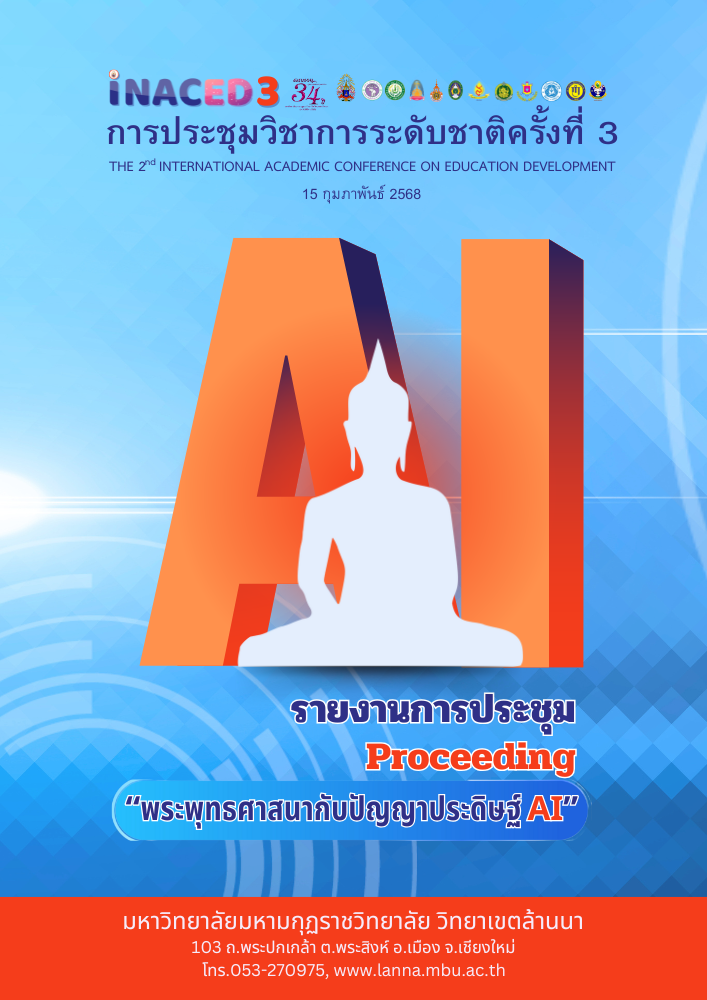หลักวุฒิธรรม 4 กับภาวะผู้นำของผู้บริหารสถานศึกษาในยุคปัญญาประดิษฐ์
บทคัดย่อ
ในยุคที่เทคโนโลยีปัญญาประดิษฐ์ (AI) ก้าวหน้าอย่างรวดเร็ว ภาวะผู้นำในสถานศึกษามีความสำคัญอย่างยิ่งในการนำพาสถานศึกษาให้ก้าวผ่านการเปลี่ยนแปลง ผู้บริหารสถานศึกษาที่ประสบความสำเร็จในยุคนี้ควรมีลักษณะของภาวะผู้นำที่หลากหลาย เช่น ภาวะผู้นำเชิงเปลี่ยนแปลง ภาวะผู้นำแบบมีส่วนร่วม และภาวะผู้นำเชิงกระจายอำนาจ เพื่อสร้างวัฒนธรรมองค์กรที่เปิดรับนวัตกรรมและส่งเสริมการเรียนรู้ตลอดชีวิต นอกจากนี้ หลักวุฒิธรรม 4 ประการ ยังเป็นแนวทางที่สามารถนำมาประยุกต์ใช้ในการพัฒนาภาวะผู้นำในสถานศึกษาได้อย่างมีประสิทธิภาพ ได้แก่ 1) การส่งเสริมการคบหาคนดี (สัปปุริสสังเสวะ) สร้างทีมงานที่มีคุณธรรม จริยธรรม และมีความสามารถ 2) การฟังธรรมและเรียนรู้ (สัทธัมมัสสวนะ) เปิดรับความคิดเห็นจากทุกฝ่ายและเรียนรู้จากประสบการณ์ 3) การคิดพิจารณาอย่างแยบคาย (โยนิโสมนสิการ) ตัดสินใจอย่างรอบคอบโดยใช้ข้อมูลและเครื่องมือที่มีในสถานศึกษา และ 4) การปฏิบัติธรรมอย่างถูกต้อง (ธัมมานุธัมมปฏิบัติ) ประพฤติปฏิบัติด้วยความเป็นธรรมและจริยธรรม
ดังนั้นผู้เขียนบทความได้นำเสนอภาวะผู้นำที่เหมาะสมและการนำหลักวุฒิธรรม 4 ประการมาประยุกต์ใช้ ที่จะช่วยให้ผู้บริหารสถานศึกษาสามารถพัฒนาสถานศึกษาให้มีความเข้มแข็ง สามารถปรับตัวเข้ากับการเปลี่ยนแปลงทางเทคโนโลยีได้อย่างมีประสิทธิภาพ และสร้างสรรค์สังคมแห่งการเรียนรู้ที่ยั่งยืน
บรรณานุกรม
Duggal, N. (2024, October 22). Incredible advantages of AI: Notable 23 benefits of AI. Retrieved 11 January 2025, from https://www.simplilearn.com/advantages-and-disadvantages-of-artificial-intelligence-article#importance_of_artificial_intelligence
Elbanna, A. (n.d.). Role of an administrator in a school: What makes them special?. Retrieved 14 January 2025, from https://blog.skolera.com/role-of-administrator-in-school/
Styker, C., & Kavlakoglu, E. (2024, Augst 9). What is artificial intelligence (AI)?. Retrieved 11 January 2025, from https://www.ibm.com/think/topics/artificial-intelligence
Talor, E. (2024, December 27). Importance of leadership in the workplace. Retrieved 14 January 2025, from https://www.theknowledgeacademy.com/blog/importance-of-leadership/
WalkMe Team. (2024, November 24). What is distributed leadership? definition, traits & best practice. Retrieved 14 January 2025, from https://www.walkme.com/blog/distributed-leadership/
Yukl, G. (2013). Leadership in organizations (8th ed.). Pearson.
ข้อบังคับคุรุสภา ว่าด้วยมาตรฐานวิชาชีพ พ.ศ. 2556. (4 ตุลาคม 2556). ราชกิจจานุเบกษา เล่มที่ 130 ตอนพิเศษ 130 ง หน้า 65 – 71
พระครูสุธีจริยวัฒน์. (2561). ภาวะผู้นำ หลักธรรมและกระบวนการเรียนรู้เพื่อสร้างสรรค์. โรงพิมพ์คลังนานาวิทยา.
พระราชบัญญัติการศึกษาแห่งชาติ พ.ศ. 2542. (19 สิงหาคม 2542). ราชกิจจานุเบกษา เล่มที่ 136 ตอนที่ 57 ก หน้า 1 - 23.
ภาวิณี สงวนวงศ์. (2562). การบริหารงานในสถานศึกษายุคใหม่. วารสารการศึกษาและการพัฒนา, 10(2), 89-104.
วิโรจน์ สารรัตนะ. (2557). ภาวะผู้นำ: ทฤษฎีและนานาทัศนะร่วมสมัยปัจจุบัน. ทิพยวิสุทธิ์.
สมเด็จพระพุทธโฆษาจารย์ (ป.อ. ปยุตฺโต). (2548). พจนานุกรมพุทธศาสตร์ ฉบับประมวลธรรม พิมพ์ครั้งที่ 12 พ.ศ. 2546. สืบค้นเมื่อ 14 มกราคม 2568, จาก http://84000.org/tipitaka/dic/d_item.php?i=179
สมเด็จพระพุทธโฆษาจารย์ (ป.อ. ปยุตฺโต). (2560 พฤษภาคม 2). พัฒนาปัญญา. สืบค้นเมื่อ 14 มกราคม 2568, จาก https://www.watnyanaves.net/en/book_detail/297
สุภาพร ภูผา. (2560). ภาวะผู้นำเชิงกลยุทธ์ของผู้บริหารสถานศึกษา. วารสารวิจัยทางการศึกษา, 7(1), 33-47.

